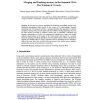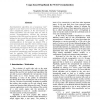915 search results - page 35 / 183 » Ranking the web frontier |
HICSS
2010
IEEE
13 years 11 months ago
2010
IEEE
1 The latent semantic indexing (LSI) methodology for information retrieval applies the singular value decomposition to identify an eigensystem for a large matrix, in which cells re...
WWW
2009
ACM
14 years 10 months ago
2009
ACM
As with any application of machine learning, web search ranking requires labeled data. The labels usually come in the form of relevance assessments made by editors. Click logs can...
ASWC
2009
Springer
13 years 10 months ago
2009
Springer
In this paper we propose algorithms for combining and ranking answers from distributed heterogeneous data sources in the context of a multi-ontology Question Answering task. Our pr...
ICDM
2005
IEEE
14 years 3 months ago
2005
IEEE
Recommendation algorithms aim at proposing “next” pages to a user based on her current visit and the past users’ navigational patterns. In the vast majority of related algor...
WWW
2011
ACM
13 years 4 months ago
2011
ACM
Gradient Boosted Regression Trees (GBRT) are the current state-of-the-art learning paradigm for machine learned websearch ranking — a domain notorious for very large data sets. ...


